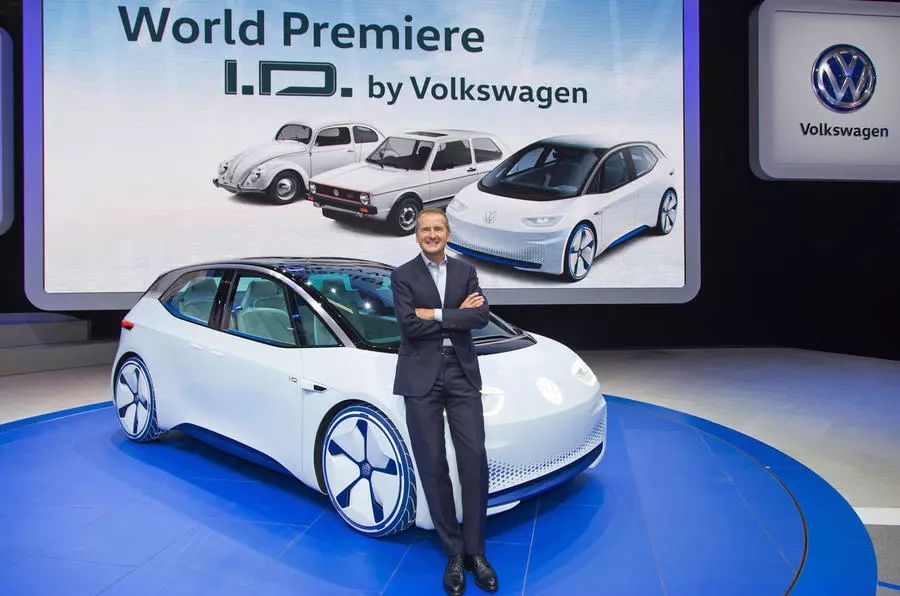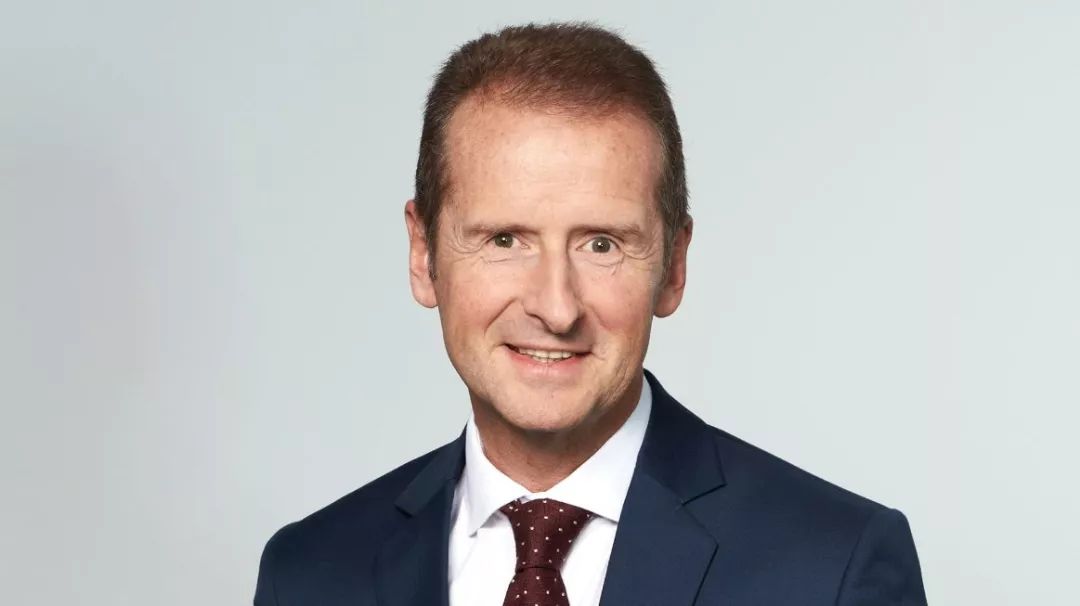On November 16th, 2018, the Volkswagen Group Supervisory Board approved the largest transformational investment plan in the group’s history: investing 44 billion euros (over 50 billion US dollars) to drive the group’s transformation towards electrification, intelligence, and mobility services.
The Volkswagen Group Supervisory Board also announced that Herbert Diess, the CEO of Volkswagen Group, the Chairman of the Global Management Board, and the Chairman of the Volkswagen Passenger Cars Brand Management Committee, will also serve as Chairman of the Volkswagen China Management Board next year.
On the same day, Volkswagen China held a press conference in Guangzhou to announce the progress of its mobile travel company, YIJI Intelligent, which has been established for one year.
Herbert Diess is a reformist business leader who is focused on the future, China, and Tesla.
By 2023, Volkswagen will spend one-third of the group’s capital expenditure, up to a total of 50 billion US dollars, to accelerate the implementation of its 2025 strategy. This is not only the largest future investment plan for Volkswagen, but also for the entire automotive industry. As a traditional fuel vehicle company with the deepest accumulation and largest size in the traditional fuel vehicle field, Volkswagen has become the most resolute leader in bidding farewell to the old era.
To some extent, the approval of this plan can be “attributed to” the largest industry-wide scandal three years ago, the “Dieselgate” event.
That scandal has attracted the attention of all parties, including the government, the industry, and consumers, as well as Elon Musk, CEO of Tesla, a natural competitor of German automakers.
Shortly after the Dieselgate scandal broke out, Elon Musk flew to the EU headquarters in Brussels and made a speech on the issue.
The Volkswagen scandal has shown one thing: the technology for emissions from internal combustion engines has reached its physical limits, and the improvements that can be achieved are very small. There must be a large number of Volkswagen engineers who are under huge pressure – they have encountered technical bottlenecks that cannot be overcome, so the only choice is to cheat.
If I took over Volkswagen, I would take a different path and lead Volkswagen to become a leader in zero-emission vehicles.
This may be the only way to save Volkswagen.
The Dieselgate event has caused Volkswagen a heavy toll: the company announced that it will buy back or repair all vehicles involved by the group at the latest by 2019, in the US, Europe, China and even Germany; the company will compensate car owners, environmental regulatory agencies, and governments more than 28 billion US dollars in total; and nine executives including former CEO Martin Winterkorn and Audi brand CEO Rupert Stadler resigned from their positions.To some extent, Elon Musk is right. However, former Volkswagen CEO Matthias Muller, who was deeply embroiled in the dieselgate scandal, believes that Elon failed to see the huge cost that a major industry leader has to bear when initiating a transformational change. As a typical “armchair critic,” he only talks without considering the difficulty of putting ideas into practice.
In October 2017, Muller publicly criticized Tesla during an event:
“If I remember correctly, some companies are the world’s number one in marketing, burn a lot of money every quarter and dismiss employees at will. Where is their sense of social responsibility? They only sold 80,000 cars last year, while Volkswagen sold 11 million cars this year, with profits of 13-14 billion euros per year.”
However, all automotive professionals around the world have to admit that Tesla, a small company with production capacity of less than 100,000 vehicles per year in Fremont, California, is breathing new life and charm into the product that has been developed for hundreds of years – automobiles. It’s hard to imagine what direction Volkswagen’s transformation would have taken with Muller, the highest commander of Volkswagen’s transformation, showing such disdain for Tesla.
Change Advocate Herbert Diess
Elon Musk’s statement is easy to understand. What people are more concerned about is: what are Muller’s challenges? Where does Volkswagen’s transformational difficulties lie?
Jack Ma said that Alibaba’s positioning is that of a national enterprise in China. When he made this statement, he also cited Samsung in Korea, Toyota in Japan and Volkswagen in Germany to explain the meaning of “national enterprise” in a more vernacular way.
As the world’s largest automaker, as of 2017, Volkswagen had 630,000 full-time employees worldwide, 100 production bases in 27 countries, and total car sales in 150 countries reached 10.7 million, defending its position as the world’s largest automaker by sales.
This is an aircraft carrier in its heyday. A comprehensive transformation towards electrification and intelligentization is akin to replacing the driving engine of a high-speed aircraft carrier.
The bigger problem is that as mentioned earlier, Tesla has long been at loggerheads with the United Auto Workers (UAW). While Elon has been working to improve the working environment, salary, and benefits of workers on the one hand, he has also resolutely opposed the establishment of a union at the Tesla factory by UAW on the other hand. The reason is that once the performance turns down and the market becomes pessimistic, the management will be restricted by the union when cutting costs and reducing teams.And the supervisory board of Volkswagen Group is controlled by representatives of the Volkswagen Works Council, who hold more than half of the seats.
In German car companies, the management board is responsible for formulating and implementing corporate strategies and operating the business, while the supervisory board is responsible for supervising the management and approving important decisions of the company. In addition, the directors of the management board are also appointed by the supervisory board. The supervisory board does not participate in daily operations, but has veto power in many aspects. For example, Dieter Zetsche, the current chairman of the Daimler Management Board, will step down in 2019 and assume the position of chairman of the supervisory board responsible for overseeing the Management Board after the two-year transition period ends in 2021.
Therefore, even if an ambitious reform-minded CEO takes office, he cannot push forward aggressively like Tesla, “acting quickly and breaking conventions”.
On April 12, 2018, Volkswagen Group announced that Herbert Diess, CEO of the Volkswagen passenger car brand, was appointed CEO of Volkswagen Group. Let us review the keywords at the beginning of the article again: “A reform-minded business leader who focuses on the future, China, and Tesla.”
First, focus on the future
In addition to being the chairman of the Volkswagen Group Management Board, Diess holds many titles in Volkswagen, but only one is truly business-oriented: head of Volkswagen Group Vehicle IT. Yes, he is personally responsible for promoting the intelligent strategy of this empire.

In terms of investment in the electrification, intelligence, and travel service fields of the Group, Diess raised the investment plan of the former CEO by 30% and eventually reached an unprecedented $50 billion. And he successfully convinced the supervisory board to approve the plan.
In addition, according to German Manager magazine, Diess hopes that the Group will spend 13.7 billion euros to acquire a 10% stake in Waymo, the world’s leading automatic driving research and development company owned by Google. However, due to lack of support from the board of directors and the supervisory board, Diess’s plan has not been implemented yet. There are also reports that Volkswagen is in talks with Apple’s automatic driving project, Project Titan.
Can spending $50 billion create the future of Volkswagen Group?
Second, focus on China
Diess’s reappointment as chairman of the Volkswagen China Management Board, while holding multiple positions, has already explained everything.
As we all know, under Diess’s new management structure for Volkswagen’s new business, Volkswagen’s global business is divided into six business units and a separately established business unit in China. Diess said, “Managing Volkswagen’s largest overseas market from the German headquarters is not a rational choice.”When interviewed by the media, Diess publicly stated that China is crucial to Volkswagen Group’s revenue and profits, and that in the electric car era, China will be in a leading position. During the recent Guangzhou Auto Show, Volkswagen China announced that it will invest over €4 billion (US$4.55 billion) with its partners in R&D and transformation of electric vehicles, intelligent interconnectivity, and mobile travel services in 2019.
So, how will this money be spent? Over the next two years, Volkswagen Group’s brands will launch over 30 new energy vehicle models in China, creating the largest matrix of new energy vehicle products in the world. By 2020, Volkswagen Group plans to deliver approximately 400,000 new energy vehicles in the Chinese market, which will increase to 1.5 million by 2025.
In addition, starting from 2019, Volkswagen will work with its partners to explore solutions for building public high-power fast-charging networks in China. The Volkswagen Group’s mobility service provider, MOIA Intelligent Travel, will be responsible for the development and implementation of Volkswagen China’s intelligent vehicle system.
Lastly, while many traditional automotive CEOs expressed their attitudes that the three-electricity industry chain was immature and that the timing of its development was not yet suitable when Tesla moved forward with its aggressive ramp-up plan for pure electric vehicle capacity due to a sense of crisis, Diess, as an automotive executive from a traditional car company, not only is familiar with Elon Musk, but also shows great enthusiasm for embracing emerging technologies. He has publicly stated that “in the old world of the automotive industry, our main competitors are Toyota, Hyundai, and French automakers. In the new world, it is Tesla.”After the news of him becoming Volkswagen’s CEO was announced, foreign media evaluation of him was “The Cost Killer” because during his time at BMW, he completed the company’s 5 billion euro cost reduction target in just a year.
As previously mentioned, after the Dieselgate scandal erupted, the former CEO of Volkswagen, Muller, expressed his dissatisfaction with Tesla’s arbitrary layoffs. In fact, at that time, Volkswagen’s layoff plan was progressing slowly due to union resistance. After Diess took office, the global layoff plan of 30,000 personnel that he proposed was successfully approved by the supervisory board through long-term negotiations with the union.
Diess’s development plan has a meticulous logical calculation. Thomas Sedran, the Chief Strategy Officer of the Volkswagen Group, revealed in an interview that according to Volkswagen’s forecast, the production cost of pure electric vehicles will be lower than that of the same level of fuel vehicles for the first time in 2023. Yes, it is the familiar year of 2023. According to Diess’s plan, Volkswagen will spend $50 billion before 2023, smashing the company’s future.
Tesla’s radical, thorough investment in emerging technologies and the lagging conservatism of traditional giants like Volkswagen have always been media highlights. One is a newly emerging force that has just emerged from the traditional car industry’s scale-effect black hole and is entering a phase of rapid development. The other is the largest global company undergoing a strong transformation strategy.
It’s fascinating to observe the transformation and evolution of an industry.
This article is a translation by ChatGPT of a Chinese report from 42HOW. If you have any questions about it, please email bd@42how.com.
